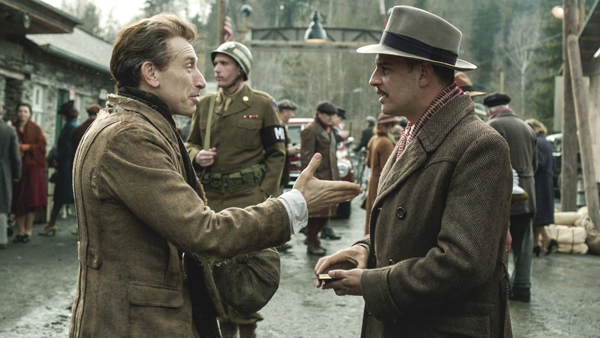The year: 1946. The place: U.S. Displaced Persons Camp, Frankfurt, Germany. The genre: Comedy. Really, and it’s enjoyable and rich with ironic humor and dark undertones.
Michel Bergmann co-wrote the script based on his semi-biographical novels The Traveling Salesmen and The Dispute that are not yet available in English. The film starts where most dramatic Holocaust films end, after liberation from concentration camps, and it opens with the statement, “This is a true story. And what isn’t entirely true is nevertheless approved.” The survivors are in restless limbo, waiting for approvals to leave the rubble around them for lands of hope–the future state of Israel or the United States. But first they have to face all the paperwork and U.S. Army bureaucracy.
David Bermann (Moritz Bleibtreu) hopes he can reopen his family’s linens store (or, he says, “the schmatte business”). He’s plotzing that he seems to the only Jew in the place who can’t get the required tradesman license. When Holzmann (an almost unrecognizably low-key Mark Ivanir) bemoans that he, and other men in the camp, need to earn money for starting their new lives, Bermann comes up with a plan. The shy Holzmann will act as the front for the license (and in the back of the warehouse as the bookkeeper). Meanwhile, Bermann interviews survivors to see who he can turn into household linen salesmen.
One was in the British Army’s Jewish Brigade, another was an actor, and a third claims he has the special talent of making Germans feel guilty. Bermann lines them up and gives them a pep talk in the art of being a peddler: “Never forget: Hitler is dead but we’re alive.” But how are they going to get housewives to buy their products when everyone has so little money? By checking the obituary notices. First the men target recent widows and claim the husband had placed an order, while one salesman pretends to have served with a dead son in the Wehrmacht. When one frau realizes the salesmen are Jewish, she assumes they’re doctors, and they proceed to make profitable cures. They also sympathetically cover for one another if one gets a PTSD-related panic attack, like after recognizing an incognito war criminal.
Bermann keeps pursuing his clearance from the U.S. Army to run his business himself. But his file has been referred to a special intelligence unit. Reporting for investigation, he is shocked to learn he is accused of collaborating with the Nazis. He vehemently protests about how his entire family was killed and how he was beaten by the Gestapo. The lead investigator is beautiful American Jewish lawyer Special Agent Sara Simon (Antje Traue), who will soon be on her way to assist at the Nuremburg trials. (No, Harvard Law School had not yet admitted women, though Simon claims to be a Harvard graduate.)
Like Scheherazade, Bermann starts spinning a tale that can both clear him and let him see Agent Simon again. His story may or may not be true: that he was ordered to tell jokes to the SS in a concentration camp in exchange for better treatment. He recounts how he was even forced to tell jokes to Hitler, which he turns into an elaborate plan for an assassination.
His command performances don’t seem any more far-fetched than the true story portrayed in Stefan Ruzowitzky’s The Counterfeiters (2007), or the kind of humor referenced in Ferne Pearlstein’s The Last Laugh (2016). Yet even his salesmen start getting suspicious of all these interrogations: Was he a kapo (a Jewish prison trusty carrying out SS’s directions)? His bitterness erupts: “On whose life can I swear? They’re all dead.”
Though Bermann’s romance with the lawyer isn’t all that credible, the guilt-ridden survivor, with his chutzpah and the gift of gab, certainly deserves a respite. (Holzmann, too, has a romance, with his fraulein secretary.) This past year there has been a spate of wonderful post-liberation documentaries about survivors’ lives: Jon Kean’s After Auschwitz, Leah Warshawski’s Big Sonia, Serena Dykman’s Nana, Alon and Shaul Schwarz’s Aida’s Secrets. As seen in these films, a good sense of humor was key for those who adjusted the best.
The writers and the director mean for Bermann to represent the German Jews who returned and stayed, including the filmmakers’ fathers. They were among the 4,000 who, according to the concluding scroll, didn’t talk about the past. (Janina Quint only found a couple from such families to interview in her documentary Germans & Jews (2016).) Bye Bye Germany effectively speaks for them all, with verve and sensitivity.







Amazing story.
Highly underrated film.
The twists and turn follow a plot beautifully and shockingly.
Not for the weak at heart.